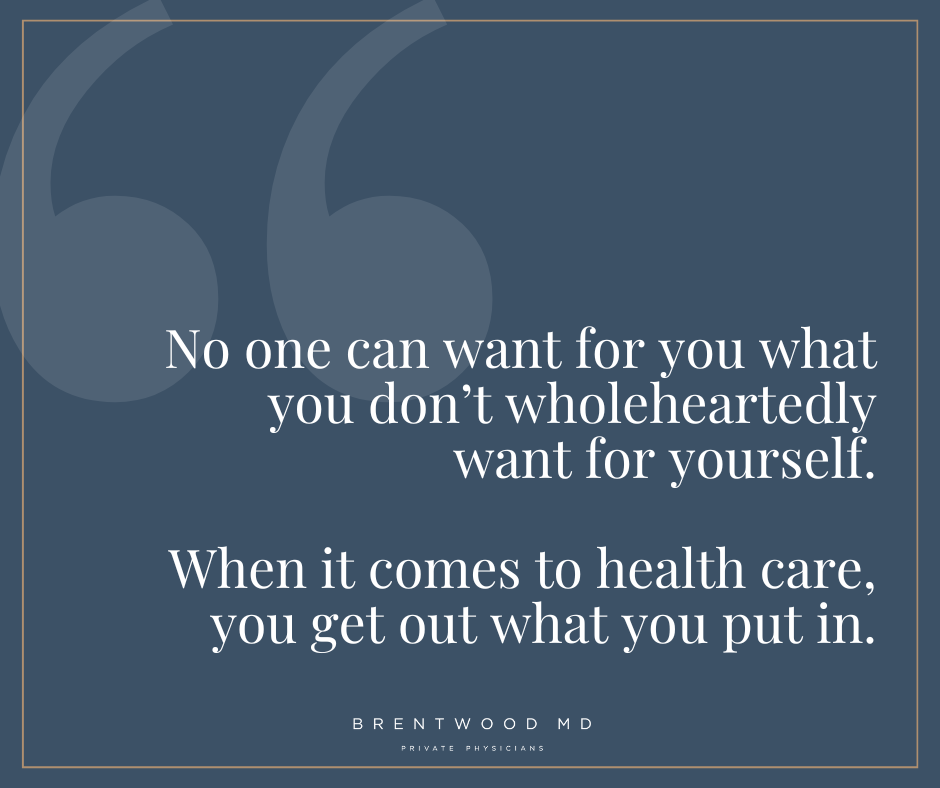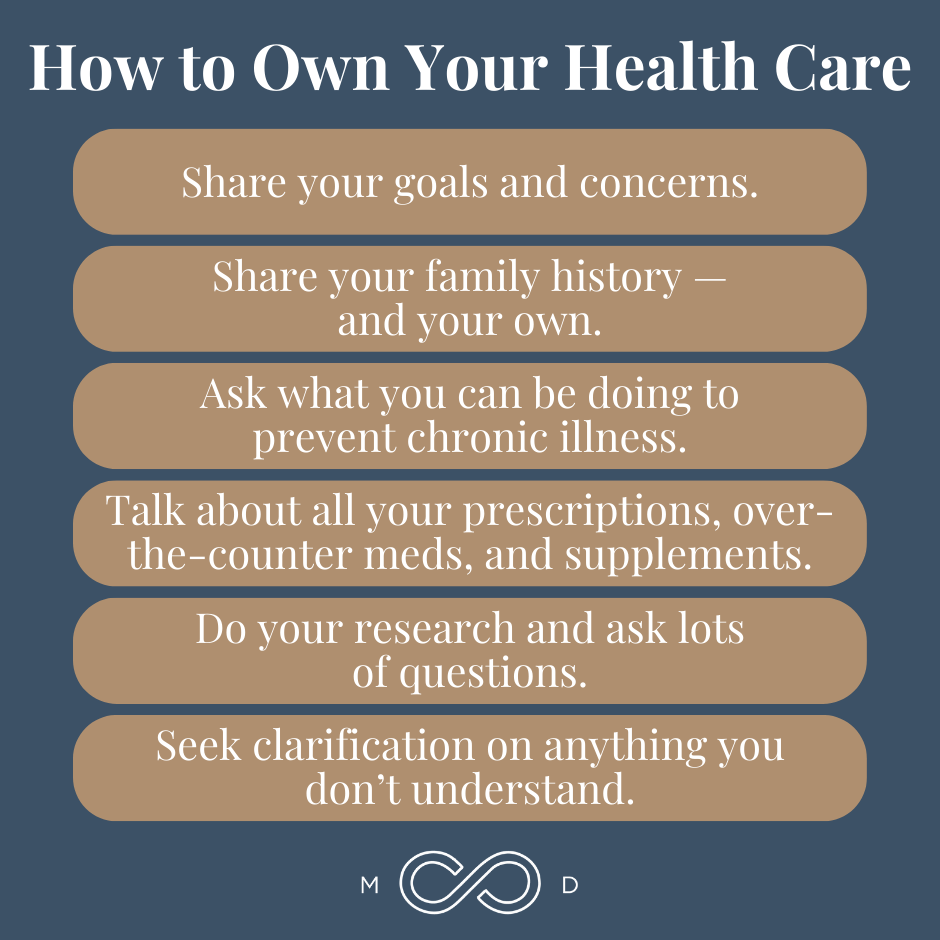Some things get worse as they get better. This paradox applies particularly well to our country’s healthcare system.
The U.S. gets better and better at treating advanced disease, but continues to fall short when it comes to disease prevention. We have highly trained and talented physicians, but many struggle to practice medicine to their full potential. They’ve been forced into a transactional, rushed, and impersonal care-delivery model. They simply don’t have the bandwidth to provide the holistic, preventive care you deserve.
But what if I told you that patient-centric, preventive care is within reach? It starts when you commit to owning your healthcare experience.
Gone are the days of “Yes, doctor” — no questions asked. Passive participation is out; self-advocacy is in. When you bring a more curious, questioning, and engaged attitude to your appointments, you’ll get more out of your doctors’ visits.
Our Healthcare Industry Has Become Increasingly Transactional
In a transactional healthcare model, the patient is a consumer with a problem that the provider must solve as quickly and economically as possible — diagnose, treat, resolve.
Contrast this with a relational or patient-centric model, in which the patient’s values, needs, and appropriateness of care are explored on a deeper level. This more holistic model focuses on overall well-being, lifestyle, and prevention.
A big problem with the transactional model is that the provider needs something tangible to treat. Doctors are incentivized by insurance companies to address clear and present dangers. You’ll have a hard time qualifying for certain measures until you’re “sick enough.” Let’s face it: health care is impossible in a “sick care” model.
Our healthcare system is set up to address immediate concerns and end-stage disease. If you’re having a heart attack, you might have access to some of the best care in the world. But if you’re looking to manage your cardiac risk factors and stave off eventual heart disease, the system isn’t equipped to help you.
American healthcare is built on solving for imminent death, but it falls woefully short in managing the gradual progression that takes us down the road toward end-stage disease.
Diabetes, cancer, and dementia don’t happen overnight. Nobody goes from a perfectly healthy cardiovascular system one day to a heart attack the next. These are the “slow killers” that take years and decades to manifest at a crisis level.
Doctors need the resources and opportunities to help people manage their risk factors and head these diseases off well before they reach a crisis. This is a large part of why I started Brentwood MD — to provide comprehensive, ultra-personalized care that interferes in disease processes while there’s still time to turn the ship.
You Are the No. 1 Advocate for Your Health
Your physician should be vested in your optimal health and longevity, but here’s a secret: that desire needs to come first and foremost from you. No one can want for you what you don’t wholeheartedly want for yourself. When it comes to health care, you get out what you put in.
I like an education analogy here. Imagine an industrious student at a lower-cost state college versus an indifferent Ivy Leaguer. The state-college student who’s “all in” and really owns their education will enjoy a richer academic experience — and maybe more long-term success — than the Ivy League student who simply floats along for four years.
Even if the Ivy League school itself was vested in its student’s success, the student didn’t share that commitment. So, despite all the resources available to them, they didn’t benefit as much as they could have.
It’s just as important to “own” your health care — because you get out what you put in.
Take the annual physical, for example. You might show up, get a normal CBC and a few words about the importance of exercise, and assume that’s enough. It isn’t. In fact, this is exactly what’s given so many people a false sense of security on the way to end-stage disease.
What’s the alternative? Come to your appointment ready to ask specific questions and to clearly communicate your needs and goals.
Your doctor may be seeing 30 other patients that day (if you’re not visiting a concierge practice). They may not know you and your family history as well as they should. They may forget to ask you a question that would elicit key insight. This is why it’s so important for you to be proactive.
Even if you’re seeing a concierge physician who knows you and your situation well, taking ownership of your health still means you get more out of your care. (Remember the Ivy Leaguer who didn’t take advantage of the school’s benefits?)
How to Own Your Health Care
If you’d like to become more active in managing your health, here is what self-advocacy looks like in a healthcare setting:
Share your goals and concerns. Worried about midlife weight gain? Wondering if that spot could be cancerous? Let your doctor know what you want to focus on.
Share your family history — and your own. Tell your doctor about past surgeries, hospitalizations, etc. To the extent that you’re able, talk about any significant family history (e.g., does heart disease run on your mother’s side?).
Ask what you can do to prevent chronic illness. Start with the Big 3: heart disease, diabetes, and cancer. Ask about steps you can take on a daily basis.
Talk about all your prescriptions, over-the-counter meds, and supplements. Your doctor may not ask about vitamins and herbs, but it’s important to mention everything you currently take. This info can save you from harmful interactions.
Do your research and ask lots of questions. It’s good to read up, but Dr. Google is no substitute for face-to-face interaction with an experienced, trusted physician who knows your situation.
Seek clarification on anything you don’t understand. Sometimes patients don’t speak up because they don’t want to appear uninformed or troublesome, but your doctor would rather clarify than have you leave the office confused.
To be clear, self-advocacy doesn’t mean taking matters into your own hands. There’s no shortage of medical information on the internet, and it’s easy to fall down a rabbit hole of self-diagnosis and even self-treatment. I don’t recommend this.
Do your research, but with the goal of enhancing — not replacing — your relationship with your doctor.
Be Crystal Clear About Your Health Goals
Whether you see a traditional primary care provider or a concierge medicine doctor, it’s up to you to ensure you’re getting the most mileage out of your office visits. Your physician is a partner on your health journey, but you have the power to help steer the ship.
Your health care experience will be richer and more personal when you become clear about what you want out of it and when you find a team that shares your values and goals. When you can formulate questions and conversations around those goals, that’s where the magic happens.
At Brentwood MD, we provide high-touch, ultra-personalized care for our members — including our comprehensive executive physicals. You can learn more about our services here.

Dr. Aaron Wenzel is a concierge physician specializing in the care of fast-moving entrepreneurs, executives, and public figures in the Nashville, TN area. Dr. Wenzel’s diverse life experience and extensive training in family medicine, emergency care, nutrition, and hormone replacement therapies give him the unique platform to provide unmatched care for his patients.









